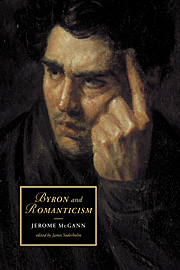Book contents
- Frontmatter
- Contents
- Acknowledgments
- General analytical and historical introduction
- PART I
- 1 Milton and Byron
- 2 Byron, mobility, and the poetics of historical ventriloquism
- 3 “My brain is feminine”: Byron and the poetry of deception
- 4 What difference do the circumstances of publication make to the interpretation of a literary work?
- 5 Byron and the anonymous lyric
- 6 Private poetry, public deception
- 7 Hero with a thousand faces: the rhetoric of Byronism
- 8 Byron and the lyric of sensibility
- 9 Byron and Wordsworth
- PART II
- Subject index
- Authors index
- CAMBRIDGE STUDIES IN ROMANTICISM
1 - Milton and Byron
Published online by Cambridge University Press: 22 September 2009
- Frontmatter
- Contents
- Acknowledgments
- General analytical and historical introduction
- PART I
- 1 Milton and Byron
- 2 Byron, mobility, and the poetics of historical ventriloquism
- 3 “My brain is feminine”: Byron and the poetry of deception
- 4 What difference do the circumstances of publication make to the interpretation of a literary work?
- 5 Byron and the anonymous lyric
- 6 Private poetry, public deception
- 7 Hero with a thousand faces: the rhetoric of Byronism
- 8 Byron and the lyric of sensibility
- 9 Byron and Wordsworth
- PART II
- Subject index
- Authors index
- CAMBRIDGE STUDIES IN ROMANTICISM
Summary
I am too happy in being coupled in any way with Milton, and shall be glad if they find any points of comparison between him and me.
Byron to Thomas MedwinWhen we think of Milton's influence upon English Romanticism the poets who first come to mind are Blake, Wordsworth, Keats, and perhaps Shelley. As for Byron, Milton rightly seems an altogether less dominating forebear since we remember only too well his distaste for blank verse, even Milton's blank verse:
Blank verse, … [except] in the drama, no one except Milton ever wrote who could rhyme … I am aware that Johnson has said, after some hesitation, that he could not “prevail upon himself to wish that Milton had been a rhymer” …; but, with all humility, I am not persuaded that the Paradise Lost would not have been more nobly conveyed to posterity … in the Stanza of Spenser or of Tasso, or in the terza rima of Dante, which the powers of Milton could easily have grafted on our language.
Byron had a number of other criticisms of Milton's poetic craftsmanship, so one is not surprised that Milton did not haunt his work. Nevertheless, Milton's importance for Byron, both in his art and his life, was by no means insignificant.
To speak of Milton's influence upon Byron is, I believe, immediately to close the discussion under two principal headings.
- Type
- Chapter
- Information
- Byron and Romanticism , pp. 19 - 35Publisher: Cambridge University PressPrint publication year: 2002
- 1
- Cited by

